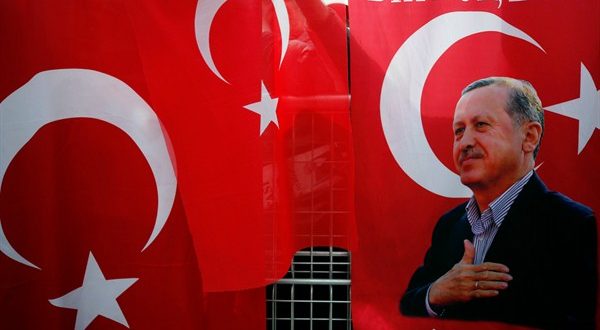By Shehab Al-Makahleh •
As Turks cast their votes in historic referendum on constitutional changes, both domestic and foreign public, media and analysts are weighing pros and cons of either outcome. According to latest exit polls Turkish voters have handed President Erdogan sweeping new powers. The ‘Yes’ campaign won 1.25 million more votes than the ‘No’ campaign, with about 600,000 votes still to be counted. The ‘Yes’ vote had about 51.3% in contrast to 48.7% votes cast for the ‘No’ option. Turnout exceeded 80%. The three largest cities – Istanbul, Ankara and Izmir – voted against the changes.
With this win, Turkey faces a complicated cluster of problems which would lead to rekindling skirmishes between the Turkish government and other parties opposing Erdogan plans such as the Kurdish militants, to repeated Daesh attacks in the country and the extended state of emergency which was placed following the coup attempt last July. Current regional situation and the set of internal Turkish issues show deep social polarization across two diametrically different lines: the nationalists with romanticized image of the Ottoman era that Erdogan seeks to revive; and the pro-European, modernist one on the opposite end.
The most important thing about today’s referendum in Turkey is that the ‘Yes’ vote would be eliminating the post of the Prime Minister, and effectively put all the executive powers in the hands of the president. And the president is himself the key contentious issue.
Since Ankara’s relationship with both EU and US has seriously deteriorated in the past year or two, due to a range of factors, most analysts are concerned with the effects of the “Yes” vote on the future of these relationships.
Turkey’s crucial geostrategic location, on the crossroads between Europe and Asia, makes the effects of referendum―whichever option wins― a matter of great concern both to the EU and US, and the neighboring Arab states, as well as Russia with whom Turkey shares borders in the strategically important Black Sea.
Overall impression, both internally and externally, was that should the majority of Turks vote ‘Yes’ in the referendum Turkish president Erdogan will be given too much power, as the ‘Yes’ vote on referendum seeks to transform the current parliamentary system into an executive presidential system. Fears of concentrating too much power in the hands of a man already strongly criticized as an autocrat, and an unreliable partner by the West, and mocked as a new Ottoman sultan, both within and without Turkey, are justified for many reasons.
Relations with Arabs
Turkey’s serious problems with its immediate Arab neighbors started during the Arab Spring, and culminated with the overt and covert support for various ‘rebels’ and even terrorist groups in particular in Syria. The key problem became the support that the Turkish government, openly or secretly or both, has given to Daesh (Islamic State) in the recent years. The oil trade it has been conducting with the international terrorist group has become Turkey’s key relational stumbling block.
While Turkey previously eyed only the Syrian north, and fighting Kurds both sides of the border, Arabs kept their discontent in check, but when Erdogan’s expansionist ambitions stretched to the Persian Gulf and even Africa to include establishment of military bases in Qatar and Somalia things changed drastically. The military aspect became a central issue for some Gulf Arab states, such as UAE that saw such move as direct competition to its own regional power and influence, and has strongly opposed it.
Relations with EU
Until the early last year’s lauded $6.6m worth EU-Turkey refugee deal things have seemed to have been on the upswing. Amidst internal dissent and terrorist attacks in which immigrants were involved, the EU attitude changed towards Turkey, and vice versa. Only days before the referendum, Turkish president stated that the EU-Turkey relations were on an all time low. Internally, this rabid anti-EU rhetoric was seen as aimed at collecting political points ahead of referendum, but will most likely backfire from more than one direction.
Relations with US
While already ongoing during Obama’s administration, the US–Turkish relations took a nose dive following last year’s July coup d’etat, for which Erdogan openly accused the US for orchestrating, while Russia has been credited for warning and potentially saving his skin. To this day Turkish government insists that the US extradite Erdogan’s main opponent, Fethullah Gulen whom he considers as the coup mastermind. Inside the country the anti-coup purge is ongoing parallel with the crackdown on Kurds, journalists, dissidents and other opposition figures.
Relations with Russia
Despite Turkish involvement in the Syrian war on the side opposing Russian ally president Assad, its support and collaboration with the terrorist groups, diplomatic and trade relations with Russia were solid and expanding until 24 November 2016 when the Turkish air force shot down a Russian fighter jet on its way back from anti-terrorist mission along Turkish-Syrian border. The incident caused a deep rift between the two countries, and severing of trade and freezing of diplomatic ties. Russia didn’t respond in kind militarily although the intent was to provoke such a response, but has instead imposed trade sanctions on Turkey, including the key agricultural and tourism industries.
Several months later on June 27, 2016 under internal, mostly political-economic pressure Erdogan apologized to the Russian president Putin, calling Russia a ‘friend and strategic partner’. Russia generously accepted the apology and lifted several trade restrictions that were of mutual benefit, however, knowing that Erdogan cannot be fully trusted, kept some of the trade barriers in place. Few weeks into the thawing of the Russo-Turkish ties, Erdogan became a target of the failed coup mid-July 2016 in which Russia allegedly helped salvage his head by alerting him of impending danger. The most important internal consequence of the coup was the removal from power of the then Prime Minister, Ahmet Davutoglu.
The internal troubles for Erdogan only started to get worse from here on, with a series of terrorist attacks hitting the country’s two major cities, capital Ankara and Istanbul. The Russian ties were again shaken in December 2016, when a former policeman shot Russian Ambassador to Turkey on December 19. This week again Turkey surprised Russia by supporting the US strike on Syria, in sharp contrast to its role as a guarantor of ceasefire as set in the Astana peace process.
Why ‘No’ Win at Referendum Would Be Better for Erdogan
While most have focused on the outcomes of the ‘Yes’ win, few analysts have looked at the effects on Erdogan’s and Turkish state future if the voters would have chosen ‘No’ option. So, let us consider both options in turn here.
The ‘Yes’ vote means the concentration of power in the hands of one man – the president and the removal of the prime minister’s position. The ‘Yes’ camp, led by the president himself ― who effectively rules the country by himself without having the power to do so vested in the country’s constitution― claims that the constitutional changes would bring stability to the country. While the stability is terribly needed in such a politically polarized country, in one of world’s most troubled regions, others fear that the changes would only ensure that the current president can run for another term and rule the country for another ten years. To those fighting for Western style democracy this would be a nail in the coffin and legalization of one man’s dictatorship.
The ‘No’ vote would have delivered a short term political blow to Erdogan and push him to seek other avenues to establish stability in the country, perhaps through compromise with political opponents, including key figures from his own ruling AKP party, such as former president Abdullah Gul and former prime minister Ahmet Davutoglu. In the long term the ‘No’ vote would actually ensure that Erdogan does not meet the destiny of his neighbors, such as Saddam Hussein or Hosni Mubarak. Indeed, he would be well advised, should he fail to reach compromise and stabilize the country, to seek a suitable successor rather than wait for the ‘Turkish Fall’ likely to erupt towards the year’s end due to social, political and economic issues.
Last year’s coup d’etat is an indicator that those who sought to remove him might have failed then, but have destabilized the country enough to pave the way for success the next time. Along with the unabating war with the Kurds, economic sanctions imposed by Russia, and the thug-of-war with the US and EU, Erdogan’s best bet would be to step down as did Mubarak, when the public outcry grew too loud. The move saved his life, although he had to endure the trial. Saddam Hussein unfortunately was not wise enough to foresee the trouble. Moreover, Turkey’s flirting with the terrorists as well as his constant swinging between Russia and US, makes him a political nuisance that all parties at this stage would likely be happy to do without.
Kurdish Autonomy through Diplomacy
About 50 million Turkish citizens have decided on the country’s future today. Erdogan should have hoped for ‘No’, as the ‘Yes’ win would cost him more than he or country can afford. Moreover, his absolute grip on power would most likely lead not only to his removal, but also to the country’s implosion. Kurdish issue and economic recovery should be his key policy priorities. Instead of pushing for Kurdish state in neighboring Arab states of Syria and Iraq, to leave a lasting legacy that he claims to seek, and rebuild bridges with the Arabs he should play diplomacy and grant Kurds wide autonomy within Turkish borders, or else, he would have to give it anyway, albeit by other means. And, diplomacy by other means, as we know is ― war.
 Geostrategic Media Political Commentary, Analysis, Security, Defense
Geostrategic Media Political Commentary, Analysis, Security, Defense





